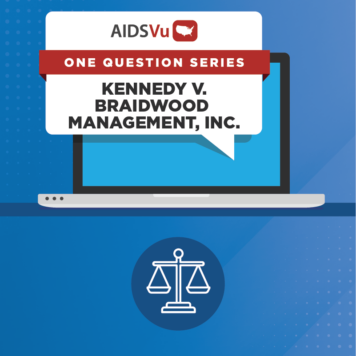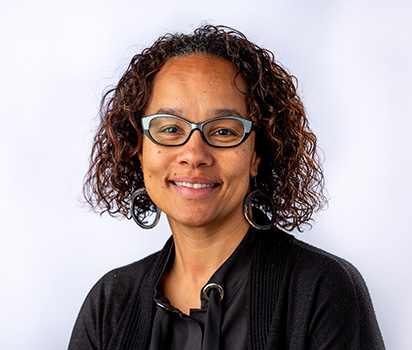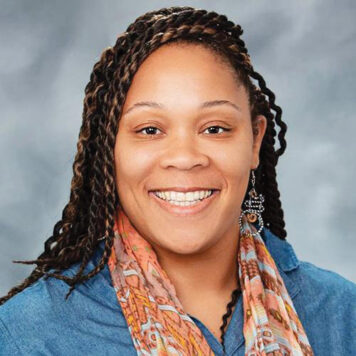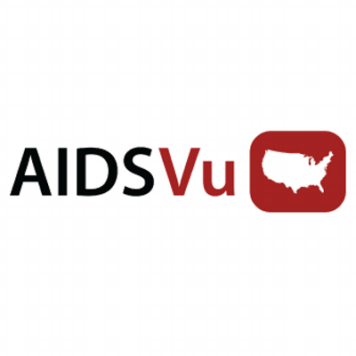Rev. E. Taylor Doctor is the Capacity Building Manager at HealthHIV and an ordained minister.
Q: You are originally from South Carolina, and you now work in Washington, D.C.; can you share your perspective on being a Black gay man from the South and how that motivated you to start working in HIV?
Truthfully, the answer to it grows and changes as much as I do. To be Black and male and gay and from the South, to me, is almost a catch-22. It’s a paradoxical situation that I can’t escape from. I can’t fight my identities. It’s a constant reminder that in this world, I’m not supposed to be enough. I’m not supposed to be focused enough; I’m not white enough; I’m not straight enough. There’s a whole lot of “not enough” that comes with being Black and gay and male and from the South. I am grateful to know that I am enough; I am much more qualified; I am much more articulate; I am much more focused. All of these things where the world says I am not enough, I am more than enough of.
I know that I am called to greatness. I look to my personal lineage and I know that I descend from a long line of thermostats, so to speak – people who always set the temperature in a space. In my hometown of Charleston, South Carolina, my family is known as people who challenge systems and make things happen for people who have difficulty making things happen for themselves. This lineage comes with the obligation to share my perspective loudly and tell people who share the same challenges as me that they can sit at the same table as I sit. It also means I have to remember to be cautious at all times in the world that we live in because for Black communities, it is almost taboo to be gay and to be Black. Gay, and from the South is a whole other thing. That all motivates me to do the work I’m doing because I know the statistics for Black Gay men in public health, specifically in HIV. It motivates me to share the other story – a narrative that counters the ideas we have about data and epidemiology and Black Gay men and HIV.
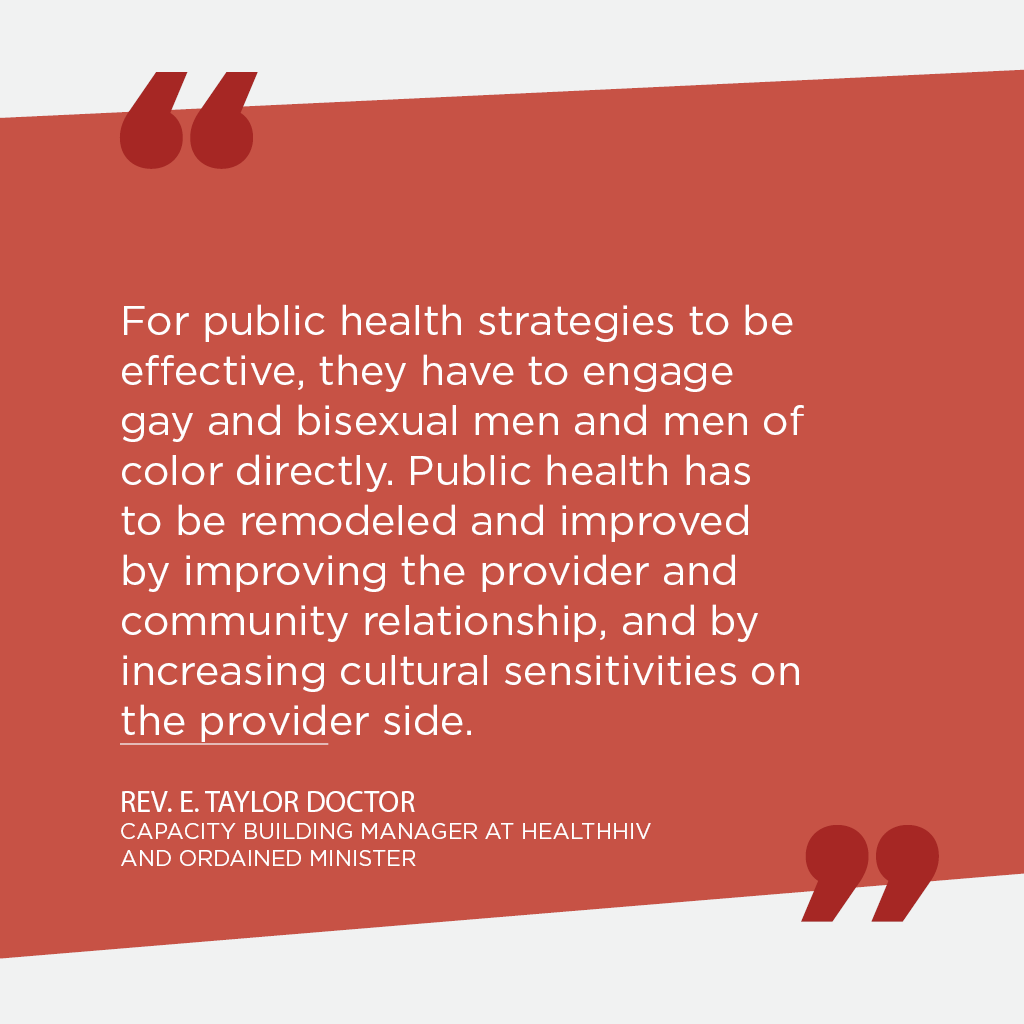 Q: You recently presented a poster at the International AIDS Conference in Amsterdam on “Engaging MSM of Color Leaders in Guiding HIV Prevention, Outreach, and Service Delivery.” Can you tell us about the poster’s key findings and your work on this topic?
Q: You recently presented a poster at the International AIDS Conference in Amsterdam on “Engaging MSM of Color Leaders in Guiding HIV Prevention, Outreach, and Service Delivery.” Can you tell us about the poster’s key findings and your work on this topic?
The poster details how to include community leaders of color in responding to HIV. It proposes creating an advisory body comprised of Black, Hispanic, and other men who have sex with men of color who live in the areas most impacted by HIV. The poster is a direct response to the statistics, presented in 2015, that half of all Black gay men and a third of Hispanic and Latino gay men will be diagnosed with HIV in their lifetime. The advisory body will use that statistic to form, inform, and assist in the development of a training curriculum for state and local health departments, as well as community-based organizations, to increase outreach and engagement with people of color. It would create curricula and training around cultural competency, addressing racism and stigma, looking at mental and behavioral health, incorporating epidemiology, addressing prevalence, and understanding different health outcomes. We want to understand what factors most increase or decrease someone’s engagement in prevention and care.
Some of the key findings of the poster were that in order for public health strategies to be effective, they have to engage gay and bisexual men and men of color directly. Public health has to be remodeled and improved by improving the provider and community relationship, and by increasing cultural sensitivities on the provider side. Public health needs to provide continued professional development opportunities regardless of someone’s color. People need to become educated and competent around health issues that affect their communities specifically and affect those communities differently than any other. We have to continue to apply community stakeholder feedback to keep improving.
Finally, we have to empower men who have sex with men of color to be champions of their own health. For a long time, existing systems created medical mistrust for men of color. Men of color have not always had the opportunity to understand what it means to own their health. At HealthHIV, we have a leadership team of more than 25 Black and Hispanic men who have sex with men who inform all of our programs across all portfolios. They work in prevention, education, advocacy, and evaluations. They are constantly informing our work to make sure that it meets the needs and desires of their communities. That is the way forward.
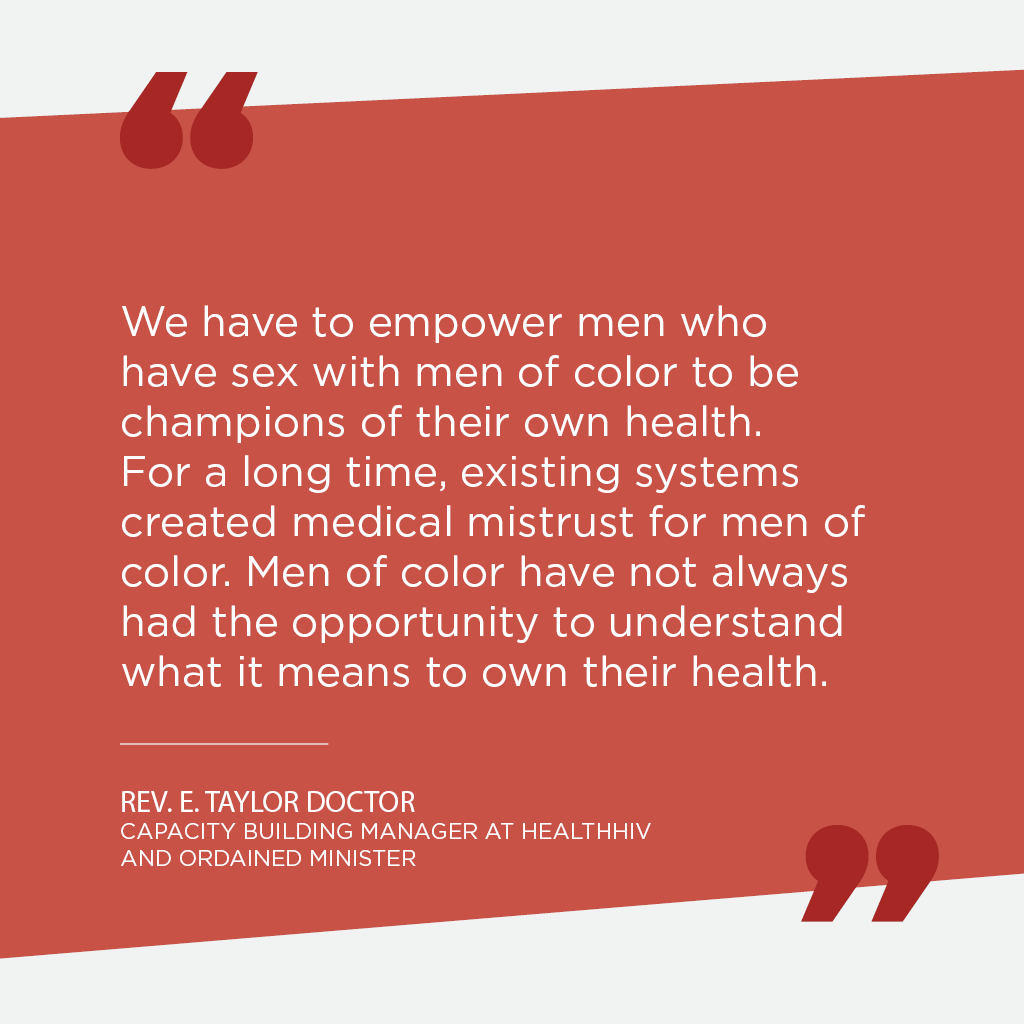 Q: The U.S. HIV epidemic disproportionally impacts young Black and Latino gay and bisexual men. What are the most important strategies to reach young men who are at high risk for HIV?
Q: The U.S. HIV epidemic disproportionally impacts young Black and Latino gay and bisexual men. What are the most important strategies to reach young men who are at high risk for HIV?
I think we have to be more creative than just trying to increase PrEP uptake. The narrative is often just, “Let’s get people on PrEP, let’s get people on PrEP.” I think we have to allow people to feel like they have the chance to be a champion of their own health. That is a more important message because if we can help a young Black or Hispanic gay or bisexual man to understand what it means to practice safe sex, then we have made real progress. They need to know that it doesn’t always have to be with a condom, but there are other ways to reduce risk behaviors. We need to make sure they have a toolkit that helps to protect them and give them the best health outcomes possible, versus always pushing PrEP on them. Some young men are getting tired of hearing that same message. They are tired of hearing about what they need to do and that what they are now doing is wrong. If we can allow them to express their needs and not assume their risk for them, that is a good strategy for getting and keeping them engaged. We have to be creative in how we communicate vital information as well. It isn’t always best to have meetings or release a briefing or long papers of statistics. These health outcomes have an effect on their families, friends, the people they can call on, their brothers. It’s personal and how we communicate it should be personal.
Q: As an ordained minister, how does your religious affiliation affect the way you approach your work in HIV? 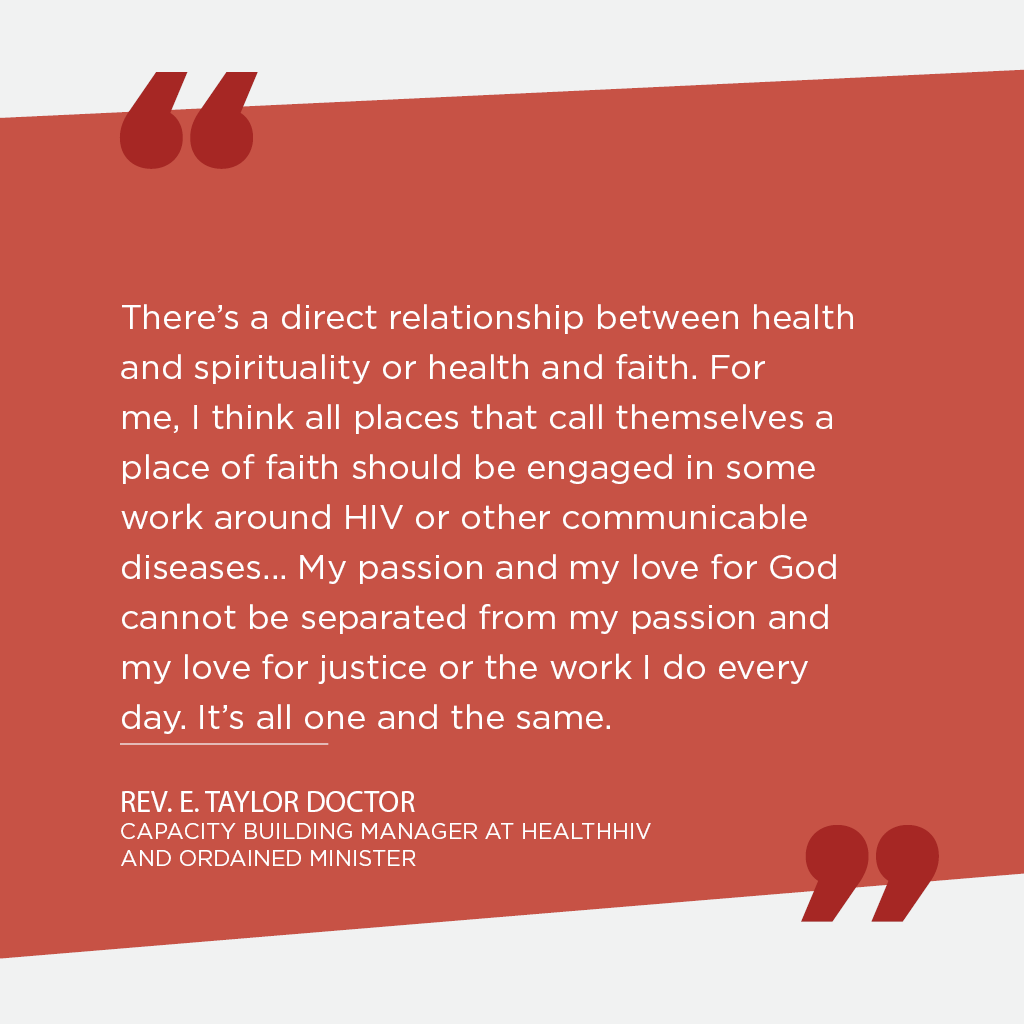
For me, it’s very complicated, because as a Black gay man I should not be an ordained minister according to the culture from which I come. In Charleston, I was born into a family that was half conservative Pentecostal and half Presbyterian. Those are almost two completely opposite spectrums. Pentecostals don’t necessarily agree with my truth, but my very liberal affirming Presbyterian family never had an issue with my truth. For me, I’m an ordained minister who appreciates charismatic and liberating worship but also has an affinity for organized structure and administration. I believe that I have a direct call from God to affect and engage people of faith, regardless of their sexual identity or their lived experiences. I approach my work in HIV with the same mentality. Every day I wake up, I try to be the change I want to see in the world.
There’s a direct relationship between health and spirituality or health and faith. For me, I think all places that call themselves a place of faith should be engaged in some work around HIV or other communicable diseases. People need to be informed, and churches are a great place to make responsible decisions that help communities be better and healthier. My passion and my love for God cannot be separated from my passion and my love for justice or the work I do every day. It’s all one and the same.
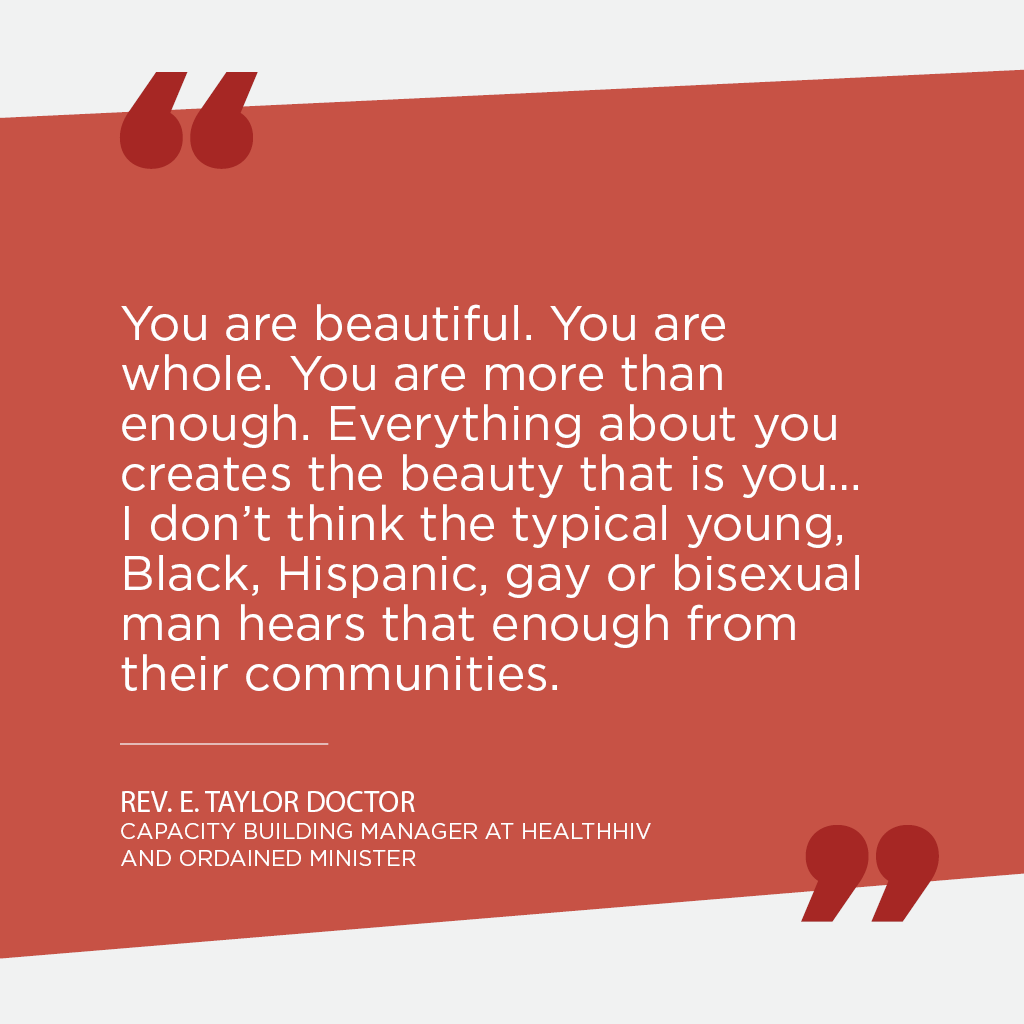 Q: With National Gay Men’s HIV/AIDS Awareness Day coming up soon, what is your message to the community?
Q: With National Gay Men’s HIV/AIDS Awareness Day coming up soon, what is your message to the community?
You are beautiful. You are whole. You are more than enough. Everything about you creates the beauty that is you. You are not pieces and parts; you are a whole being that is full of experiences, full of knowledge, and full of wisdom. We are waiting for your wisdom. The world needs your experience and your knowledge. I encourage you to surround yourself in spaces and with people and things that help you be the best person that you want to be and help you support the truth that you choose to live. I don’t think the typical young, Black, Hispanic, gay or bisexual man hears that enough from their communities.
We need to spend time developing the generations to come. Every gay and bisexual man of color should have mentees and should be giving back to OUR community in some way, shape, or form.

